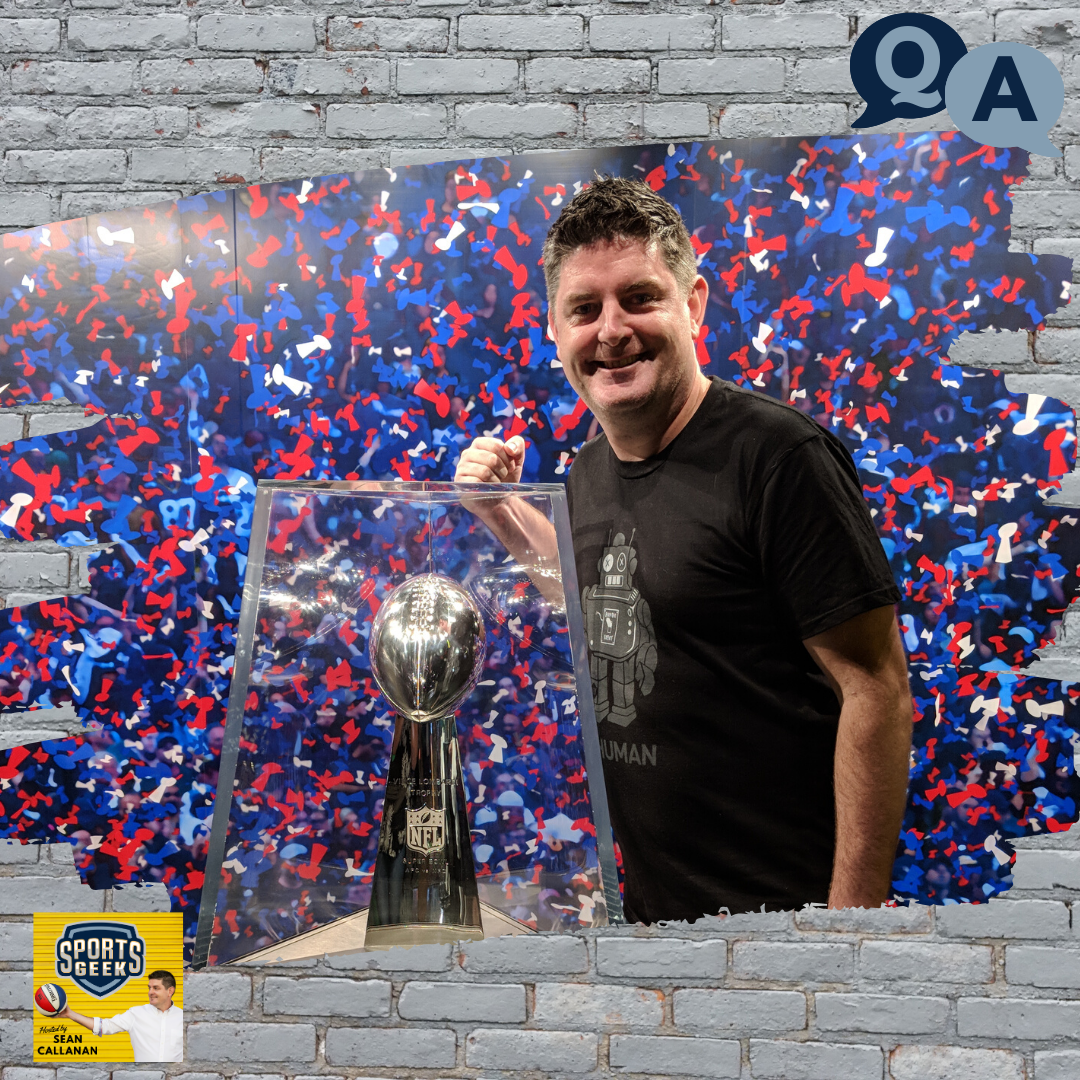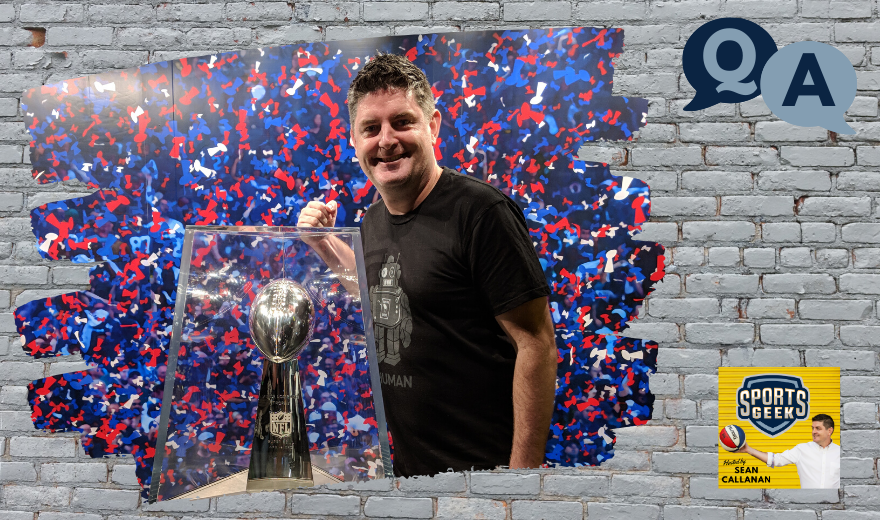On this Sports Geek Q&A episode Sean Callanan answers the following questions:
- How important is it for sports to address sustainability? Lewis Mitchell via Linkedin
- What’s are the most important aspects for a sports organization or team when globalizing their brand and business? Chase McCarthy via Linkedin
- The NFL Experience Times Square did not last long surprisingly but I visited as well. Why do you think retail / experience outlets like this failed? NBA and NHL stores downsized and here comes MLB’s first retail store in NYC Vincent Accardi via LinkedIn
Listen to Sports Geek Q&A for the answers
Can't see podcast player? Click here to listen
Read Sports Geek Q&A answers below
[00:00:47] Let's get into it. Question 1 comes from Lewis Mitchell via LinkedIn. How important is it for sports to address sustainability? I love this. Big questions, big questions for the Q and A, I think is very important and not only for the for the massive region reason of the environment and and having having a future world that's that's livable. There's also massive reasons both financially and also what the fans actually want. Someone you should. Connect with is Aileen McManamon apologies, Aileen, as someone who gets my name, mispronounced my apologies, but she's very much a sports sustainability champion. Click the link in the show notes. But Lewis did link to Adidas is making Real Madrid jerseys from recycled materials, also the Adidas Parley from recyclable materials. I do think the reason that Adidas is doing these kinds of things is it's what the market wants. They are looking for sustainable products. So there is definite business decision behind it. And so that is normally a big motivator for sports. But I think there's a lot of the other pieces. One, yes, the fans want it and the customer wants it. But there actually is some really financial benefits, too, and savings for being sustainable. The Victoria Racing Club, where the Melbourne Cup is held, was held last Tuesday when this when this gets published has put in a lot of work in a sustainability point of view from a to a point of crushing their own glass. So they're shipping out more glass for recycling, taking a lot of the food waste and creating fertilizer that's been used on on the roses, solar panelling on top of all the new grandstand. And so even though it's a big outlay to roll out these projects initially, over time, they provide massive sailing savings. So, yes, sports sustainability is super important. I think more sports teams, I think it's going to start with stadiums and venues. They've got the biggest opportunity. So seeing things like no plastic straws, those kind of things and starting to see that happen on scale. So thank you very much, those few you who question and pointing out that at desk Real Madrid, Jersey story, it's obvious that it is very front and centre for Adidas or Adidas for the people in the US. That's how they go about saying it.
[00:03:36] Question 2 comes from Chase McCarthy, also via LinkedIn. This is these questions all came from the original post where I said, Hey, send in your questions. So thank you very much Chase. His question is what are the most important aspects for a sports organization or team when globalized in their brand and business? So it's again, big question around how do you expand and globalize your brand? I guess my first point is all teams are now global. The Internet has made that possible. Every team is global, whether a team is doing anything or not. Some of it becoming global because of the strength of the league itself and others are becoming global because they're doing specific outreach in particular regions. I think the the football clubs of Europe are the the the benchmark. They're the ones that have pushed harder into into new markets quicker. Looking at things like different language strategies and strategies for different countries. One episode I do think you should go listen to this episode 168 SportsGeekHQ.com/168 there you can listen to Andrew Collins from Mailman who is based in China. He is actually helping teams connect with the Chinese market and the Asian markets, so and doing that by understanding the local market, understanding the community is still vitally important even in global sense. So it's not a matter of simply just taking your logo and rolling out the same program and content that you do at home, in your home market into another market and expect it to be consumed. It has to have that local feel and understanding of how sport is consumed in the local market. So I think there are a couple of the key things. I think if you're driving the content for a big sports org, you've got to realize that it is global. It might be great to be talking in a tone to your local fans that live within a certain radius of your stadium, but a lot of that content is getting consumed by a global audience. So understanding that, but then having a concerted effort for those local markets I think is is very it is very vital. And that's what Andrew and the guys at Mailman do for a lot of teams in in different markets outside their own home market. So I think it's understanding that local markets is vital.
[00:06:15] And the last question. Question 3 actually comes from the post itself, where I posed with the NFL trophy at the NFL experience in Times Square when I was there in 2018. So I used that bright, shiny trophy to garner some questions. And I got this one from Vince Accardi again via LinkedIn. He asked the NFL to experience Times Square. Did not last long, surprisingly, but I visit as well. Why do you think retail experience at lists like this failed NBA and NHL stores downsized here and here comes MLB, his first retail store in New York City. First of all, thanks a lot, Vincent, for the fur for the question. It is a funny one because the NFL experience time at Times Square is not the first, I guess, venture like this to have failed. In this market, we've we've seen an AFL themed experienced museum type of a type of store museum type of thing that has fallen over. I think part of it is the sport is the ultimate experience. We go there for these emotions that ebbs and flows the unscripted drama. And so when you go to a museum or an experience, it's been designed for you to try to better understand its board or take you back. It has a little bit installed into it, but it's not exactly the same. So. I went to NFL experience. I enjoyed it. I'm doing a shrugging shoulder motion at the moment, but it's not something I'm going to come back to again and again and again. So it is something that is it's built for tourists and for someone to understand the game, but they don't have the deep passion of the people who super love the game. So it's really hard to pitch that type of experience and get it right. One thing you might not know from a design of the NFL experience was actually designed by the guys behind Cirque de Soleil. So they know about experiences. They know how to create amazing experiences. But it is tough to replicate what that experience is for someone really new. Now, though, they had a great immersive experience that that thing where you went to and went into a theatre and you started and the you had the clashing of jerseys and helmets and the sound and then you were in a snow game and then bubbles came down. So it really did try to make you feel like you're part of the game. But again, is it something that you come back again and again and again? It's probably why I think they sometimes don't quite hit the mark.
Send in your question
sean AT sportsgeekhq.com
+61 407 047 200


